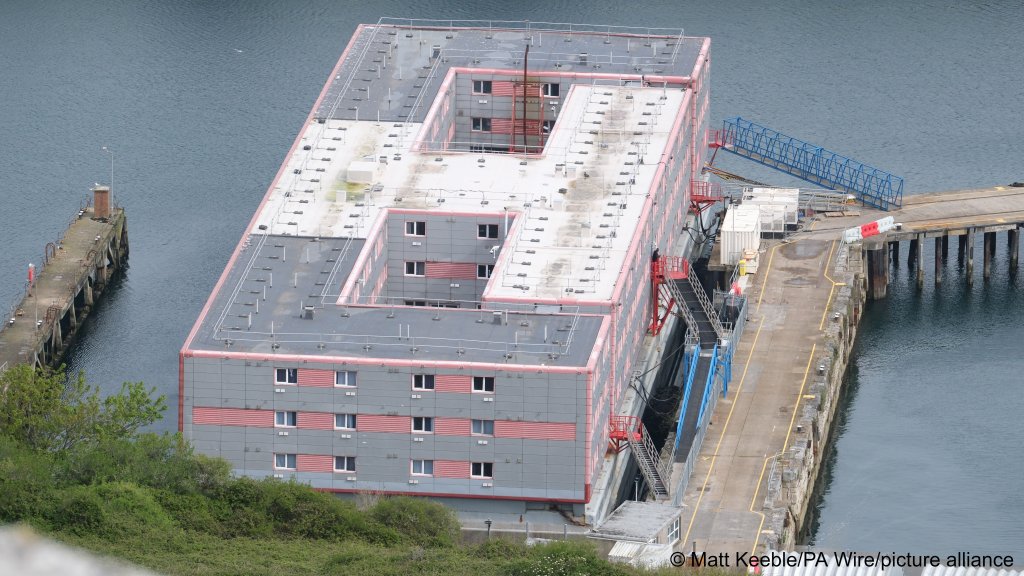The UK asylum system faces intense scrutiny over administrative inefficiencies, policy failures, and systemic flaws, leading to unsafe housing and rising homelessness among refugees.
Official figures in the United Kingdom reveal a fourfold increase in homelessness among refugees leaving asylum accommodation, with 16,500 individuals registered as homeless by June 2023 -- up from just 4,000 in the previous year.
This alarming rise highlights systemic failures in refugee support and in the broader asylum system in the country.
At the same time, asylum accommodation conditions have also drawn widespread criticism from rights groups and advocacy organizations. The i Paper in the UK reported that the Mears Group, a major contractor responsible for housing asylum seekers, has come under fire for providing inadequate living conditions, including pest infestations, structural disrepair, and basic structural deficiencies.
Despite earning £1 billion from its contract with the Home Office since 2020, the company defends its performance, attributing its profit growth to increased demand and claiming that maintenance efforts are ongoing.
Read AlsoUK: Asylum seeker accommodation costs rocket, despite government promises
Administrative failures driving homelessness
One of the primary causes of homelessness among refugees is the delayed or incorrect issuance of critical documents such as biometric residence permits (BRPs) and electronic visas (eVisas), according to the i Paper.
These documents are essential for accessing housing, employment, and benefits. Many refugees are left in limbo due to such systemic inefficiencies.

The situation has also been impacted by changes to the "move-on period," which is the time refugees are allowed to transition out of asylum accommodation. In August 2023, the government reduced this period, starting the clock from the date of asylum decision letters rather than when refugees receive their BRPs.
As a result, many were evicted before they had the necessary documentation ready to secure housing or financial support. Although the move-on period was temporarily extended to 56 days in December 2023, this measure has provided only limited relief.
Administrative delays and mismatched timelines continue to leave refugees without viable options, forcing many into homelessness.
Read AlsoMigrants in Calais: 'The UK is our last hope'
Substandard living conditions
The Mears Group, tasked with managing asylum accommodation, has long faced significant criticism for the condition of its properties. Inspections across regions in the north of England and Scotland have uncovered widespread issues, including mould, damp, collapsed ceilings and fire risks.
Some properties were reported to lack basic safety features such as smoke alarms, while others suffered from a severe state of disrepair, including faulty wiring and inadequate access to hot water.
Despite these failings, Mears has profited considerably from its Home Office contract, with asylum-related revenue accounting for 40 percent of its income in 2023 alone.

This financial windfall has drawn outrage from advocates and rights groups, who argue that corporate profits have taken precedence over the welfare of asylum seekers. Critics say that the company’s performance falls far short of acceptable standards, given the resources at its disposal.
Advocates and rights groups have described the situation as a "national scandal." Tim Naor Hilton, CEO of the charity Refugee Action, has called for an overhaul of the asylum housing system, urging the government to replace private contractors like Mears with a publicly managed regional housing system.
Such a shift, he argues, would ensure that public funds are reinvested into refugee welfare and community support rather than resulting in corporate profits.
"We need a new housing system where every pound of this money goes towards supporting refugees and investing in the towns and cities where they are rebuilding their lives," Hilton told the i Paper.
Read AlsoUK: Hotels may continue to house asylum seekers due to backlog
Criticism of government response
The previous Conservative administration was repeatedly accused of offloading refugee support responsibilities onto local councils, leaving them alone to manage a high number of homeless refugees without adequate resources.
Meanwhile, the new Labour government's temporary reforms to the system, such as extending the move-on period, have been described as insufficient stopgap measures.
The Home Office has however defended its ongoing approach, citing record removals of failed asylum seekers and efforts to phase out the use of hotels for asylum accommodation.
But systemic inefficiencies, such as poor coordination between departments and delays in documentation, appear to undermine these efforts.
Private contractors providing property services like Mears -- including companies like Serco and Clearsprings -- have been accused of prioritizing profits over service quality.
These contracts, awarded in 2019 with break clauses applicable at the earliest in 2026, have drawn criticicism for not benefiting the public, while the contractors make significant returns.
Stakeholders argue that the competitive tendering process for government contracts on the free market places too much emphasis on cost-cutting, leading to a decline in housing standards and worsening conditions for asylum seekers.
Read AlsoBusting myths about migration to help create better policy
Calls for reform
Last month, The Financial Times reported that UK government is considering returning asylum seeker housing contracts to local councils due to such growing concerns over the profits of contractors like Serco, Mears, and Clearsprings.
Some local councils, including Greater Manchester, have discussed the introduction of a locally managed system for better oversight and cost savings, but there are concerns over political risks and the need to address funding caps.
The Home Office is exploring reforms, with a view of potentially reverting to a pre-2012 model when the provision of asylum accommodation was outsourced to the private sector. However, the Home Office, too, faces challenges with funding and distribution.
Advocates meanwhile also suggest that reforms should take further needs of refugees into consideration -- like ensuring that they receive key documents before the move-on period, in hopes of preventing homelessness, improving coordination between departments, and extending the move-on period where needed.

Inquiry into asylum accommodation
On December 19, the Home Affairs Committee announced that it has launched an inquiry into the UK’s asylum accommodation system amid rising demand and increased costs, which have grown from £739 million in 2019-20 to £4.7 billion in 2023-24.
At the same time, the British government aims to end hotel use for asylum seekers and has canceled large accommodation projects like RAF Scampton and the Bibby Stockholm asylum seeker barge, which had been introduced as policies under the previous Conservative government.
Launching the inquiry, Dame Karen Bradley, Chair of the Home Affairs Select Committee, said that the goal was to "scrutinize how the Home Office and its providers are currently delivering asylum accommodation, what needs to change and what lessons can be learned as the government seeks to reset its approach."
The inquiry will in particular examine the effectiveness of current asylum accommodation contracts, the Home Office's collaboration with local partners, and the impact on local services. It will also address issues such as identifying suitable housing, safeguarding welfare, managing data, and supporting refugees transitioning out of asylum accommodation.
Read AlsoUK: Last asylum seekers moved off controversial barge
